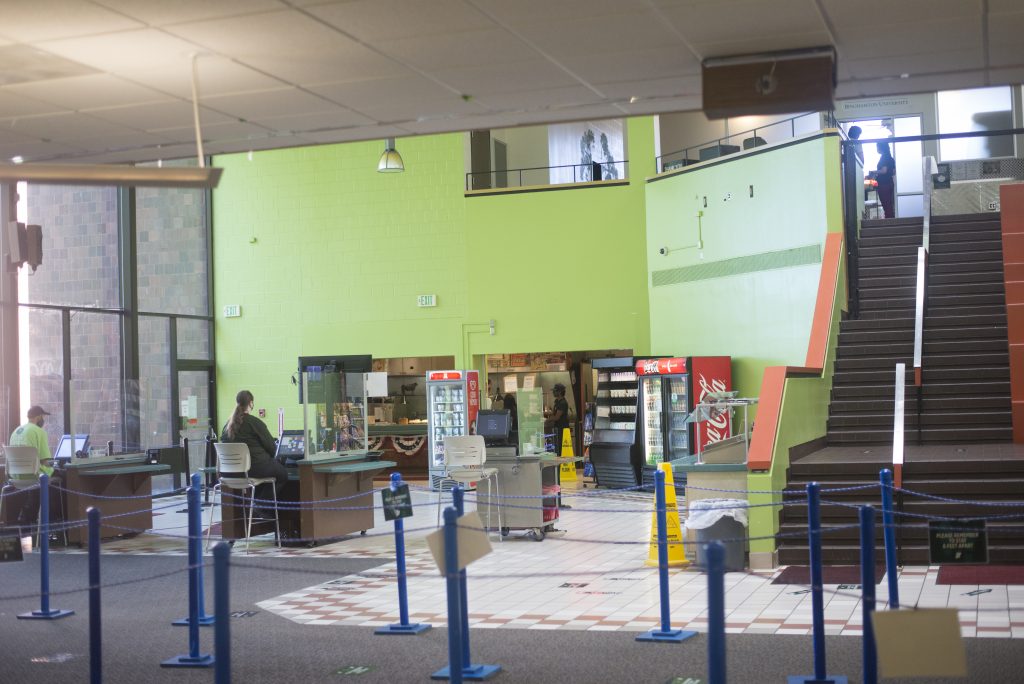Last semester, many Binghamton University students left campus early due to the coronavirus pandemic, resulting in refunds for campus-based charges and fees such as housing and parking. While students were promised refunds and credits for their unused dining dollars, the spendable balance in a student’s dining account, some have not received anything.
Those who graduated after the spring semester or decided to pursue the fall 2020 semester remotely received an automatic refund for unused dining dollars. For returning students, no unused dining dollars automatically rolled over to their fall meal plan accounts and no one received a full refund. In a March 15 email, BU President Harvey Stenger announced that meal plans would be included in refunds and credits.
“Refunds and credits will be given to all students who leave their on-campus housing for the remainder of the semester for meal plans, residence hall charges and fees related to on-campus living,” Stenger wrote. “Students returning to on-campus housing next year will have this refund applied as a credit to next year’s charges.”
According to Deanne Ellison, director of auxiliary services, BU Dining Services (BUDS) allowed for refunds to take place despite contractual obligations stating that after nine weeks of school, no refunds were to be made.
“Given the unusual circumstances surrounding the spring 2020 semester, BUDS readily agreed that a pro rata share of the administrative fee included in meal plans be refunded, even though it was after the ninth week,” Ellison wrote in an email. “For most meal plan holders, that resulted in a refund of $769 above and beyond what the contract required.”
Students were refunded for fees such as costs from stolen goods and paying employees, but not money to be used for dining.
Students living off campus or in an on-campus apartment this fall could transfer unused dining dollars to a commuter plan or the $25 Plan, which imposes no membership fees but charges 1.8 times the posted prices at residential dining halls. In light of the pandemic, BUDS has waived the usual fee associated with the transfer of a spendable balance to a lower-cost meal plan.
“This year BUDS offered some additional flexibility by permitting students to convert to a commuter plan without the usual fee and advising students on options to purchase lower cost meal plans given the amount of spendable balance rolled over,” Ellison wrote.
BUDS did not transfer unused dining dollars to another plan automatically. Instead, students had to reach out via email or phone to secure their balance. Many students in this situation were unaware of this option, potentially losing hundreds of dining dollars.
Sandra Re, a senior majoring in integrative neuroscience, left campus early in the spring and moved off campus this fall. After learning about the transfer option, Re explained that she nearly forfeited $400 worth of unused dining dollars.
“I have to email them?” Re said. “That’s really good to know so I don’t lose that money. They didn’t tell us that. I was about to buy a commuter plan. That’s terrible that they didn’t tell us that. I wouldn’t have known.”
Administrative dining fees and charges for items such as parking permits, housing and gym memberships rolled over or were refunded automatically with no need for students to reach out. Ellison wrote that BUDS publicized the information on BU’s website and sent reminder emails to students who had and have not claimed their unused dining dollars.
Yet, like Re, Sara-Ann Elbakhchouch, a senior majoring in English who moved off campus this fall, said she is frustrated with the lack of outreach from Sodexo, the company which operates BUDS.
“Sodexo never reached out to us,” Elbakhchouch said. “Student accounts reached out to us about our refunds, but Sodexo never reached out about the meal plan or anything.”
Re said she searched her email history and found that she never received a direct email from BUDS. Instead, the notification appeared in B-Line News Additions. The reminder, titled “Dining Dollars from spring 2020,” was in a list of more than 50 other notifications. When clicked, the reminder redirects to the B-Line announcements webpage, which no longer contains information about compensation for dining dollars.
Alexa Mosca, a junior majoring in biology, moved off campus this fall after leaving campus housing early in the spring and said that, despite regularly checking her email, she was unaware that her unused dining dollars did not roll over automatically.
“I had a lot of money left over from last semester and I swiped my card at the Marketplace and [the cashier] said ‘there’s nothing there,’” Mosca said. “I thought it would have just been there.”
Maeve Kelly, a junior majoring in nursing, lives off campus now and wished she had known about the option to transfer her money to a commuter meal plan after she had left campus early in the spring.
“I knew I had money left in my account last year, but I thought it was all given to me in my refund from the check over the summer,” Kelly said. “I thought they had taken all the money out of the account. I’ve already spent a ton of money at Marketplace when I’m getting food with friends that live on campus.”
Elbakhchouch said that the option to transfer money to a meal plan would have been extremely helpful, had she been informed of it by BUDS.
“When I go to campus, I have to use my own money,” Elbakhchouch said. “If I have it in a commuter plan then I can still eat at the dining hall more freely rather than worrying about prices.”
It is unknown whether students are able to transfer their meal plans since the removal of the B-Line announcement.



